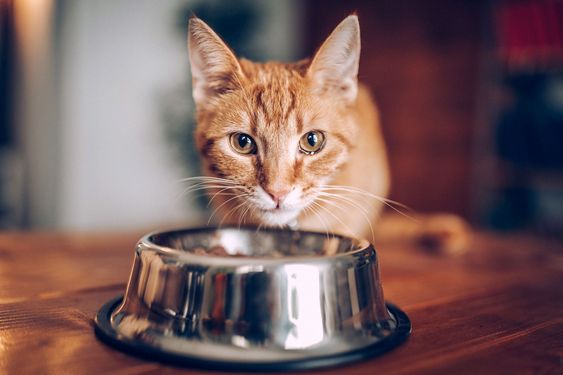How Long Can a Cat Go Without Eating?
Cats can usually go without food for one to two weeks if they can drink water. But without protein, it might be more like three to four days, even if they have enough water. If a cat doesn’t have any food or water, it’s unlikely they would live longer than three days.
Even 24 hours without food can be harmful to a cat’s health, and if your cat hasn’t eaten in more than 24 hours, it’s important to consult with a veterinarian to determine the underlying cause and get them the treatment they need.
Here’s a breakdown of how long a cat can go without food:
- With water: 1-2 weeks
- Without water: 3 days
Normal Eating Patterns of Cats
Cats are obligate carnivores, meaning their diet primarily consists of animal protein. They typically have small stomachs and high metabolic rates, which require them to eat frequent small meals throughout the day. While the exact amount of food a cat needs varies based on factors like age, weight, and activity level, most adult cats eat 2-4 small meals per day. Read about Can Dogs Eat Goldfish

Factors Affecting a Cat’s Ability to Go Without Eating
Health Condition
Underlying health issues can significantly impact a cat’s appetite. Illnesses such as dental problems, gastrointestinal disorders, and kidney disease can cause discomfort or pain, leading to a decreased desire to eat.
Age
Kittens have higher energy requirements and should ideally eat every 3-4 hours. Adult cats, on the other hand, can go longer without food but still require regular meals to maintain their health. Learn about How Long Can Goldfish Live
Weight
Overweight or obese cats may have more stored energy reserves compared to lean cats, allowing them to go longer without eating. However, prolonged periods of fasting can have detrimental effects on their metabolism and overall health.
Signs That Your Cat Isn’t Eating Enough
It’s essential to monitor your cat’s eating habits and be alert to any changes that could indicate a problem. Signs that your cat isn’t eating enough include:
- Decreased interest in food
- Weight loss
- Lethargy
- Vomiting or diarrhea
- Changes in litter box habits
Risks of a Cat Not Eating
Cats that refuse to eat or eat very little are at risk of developing hepatic lipidosis, also known as fatty liver disease. This condition can be life-threatening if not addressed promptly and requires intensive veterinary care.
How to Encourage a Cat to Eat
If your cat is refusing to eat, there are several strategies you can try to stimulate their appetite:
- Offer a variety of wet and dry cat foods
- Warm the food slightly to enhance its aroma
- Ensure the feeding area is quiet and free from stressors
- Consider offering small, frequent meals throughout the day
- Also Discover about How Many Rabbits in a Litter

When to Seek Veterinary Care
If your cat refuses to eat for more than 24-48 hours, it’s essential to consult your veterinarian. They can perform a thorough examination to identify any underlying health issues and recommend appropriate treatment options.
Conclusion
Understanding how long a cat can go without eating is essential for ensuring their health and well-being. By monitoring their eating habits, being aware of potential signs of distress, and seeking prompt veterinary care when needed, you can help ensure that your feline companion leads a happy and healthy life.
FAQs
Q: Can a cat survive without eating for a week?
A: While it’s possible for a cat to survive without food for a week, it’s not advisable and can lead to serious health complications.
Q: How can I tell if my cat is dehydrated?
A: Signs of dehydration in cats include dry, tacky gums, sunken eyes, and decreased skin elasticity.
Q: What should I do if my cat refuses to eat?
A: If your cat refuses to eat, consult your veterinarian to rule out any underlying health issues and determine the best course of action.
Q: Is it normal for cats to go off their food?
A: While occasional changes in appetite are normal, prolonged loss of appetite can indicate an underlying health problem and should be addressed promptly.
Q: Can I force-feed my cat if they’re not eating?
A: It’s not recommended to force-feed a cat, as it can lead to further stress and aversion to eating. Instead, consult your veterinarian for guidance on how to encourage your cat to eat.




